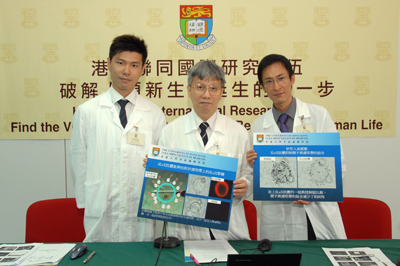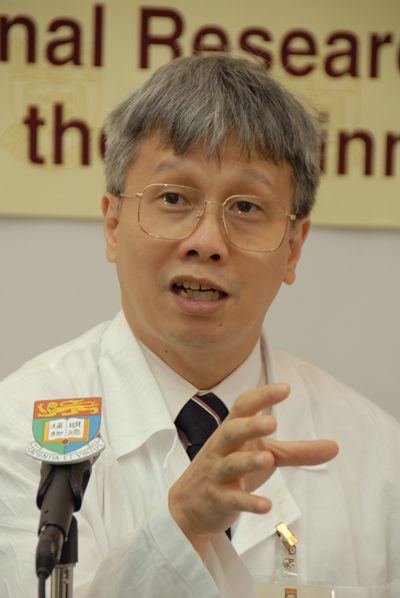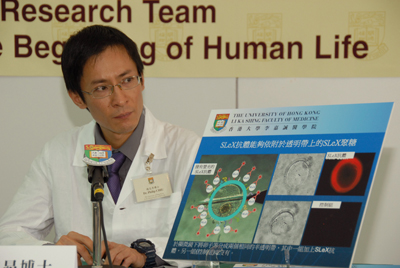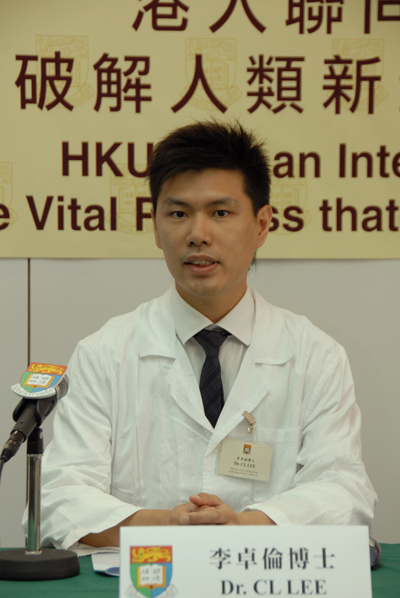HKU with an International Research Team Find the Vital Process that Marks the Beginning of Human Life
25 Aug 2011
Researchers from the University of Hong Kong (HKU) together with research groups from Imperial College in United Kingdom, Academia Sinica in Taiwan and University of Missouri in the United States have identified the key molecule on the human egg as sialyl-Lewisx (SLeX). SLeX binds to an incoming sperm thus enabling the initiation of fertilization. This vital process marks the beginning of human life. The important finding has just been published in the leading scientific research journal "Science".
According to Dr Philip Chiu Chi-ngong, a lead author of the study who is Research Assistant Professor in the Department of Obstetrics and Gynaecology at The University of Hong Kong Li Ka Shing Faculty of Medicine, "This research provides an enlightening answer to a basic and important question in human fertilization: how a sperm binds to an egg." Professor William Yeung Shu-biu, Professor in the same Department and embryologist in charge of the Assisted Reproduction Laboratory at HKU, said, "Our knowledge on sperm-egg binding in humans is limited. The identification of SLeX as the key molecule for sperm-egg binding has profound implications for the diagnosis of human infertility and the development of novel targets for fertility regulation."
The study
Human fertilization begins when sperm binds to the outer coat of the egg, known as the zona pellucida (ZP). Although sugar chains (glycans) on the ZP have been implicated in sperm-egg binding for more than 30 years, the nature of the human ZP glycans was unknown.
In this study, researchers at HKU isolated ZP from 195 unfertilized non-living human oocytes donated by patients attending the Assisted Reproduction Programme at Queen Mary Hospital for glycan analyses by their international collaborators. An ultrasensitive mass spectrometry method was used and the researchers discovered that over 70% of the terminals of the human ZP glycans had a sequence known as SLeX. The HKU team performed functional analyses of SLeX and showed that specific antibody against SLeX or exogenous SLeX can suppress sperm-ZP binding by 70-80%. Consistently, alteration of the SLeX structure reduced the binding of sperm to ZP. The results demonstrated that SLeX is the key molecule for human sperm-egg binding.
Significance of the findings
According to World Health Organization, infertility affects about 15% of couples of reproductive age. Defective sperm-ZP binding is an important cause of fertilization failure in couples seeking clinical assisted reproduction treatment. Apart from men with abnormal sperm parameters, about 15% of men with normal sperm parameters also have defective sperm-ZP binding. The identification of the latter group of men is difficult partly because we know little about human sperm-egg binding.
The work described here provides insight to the key interaction essential for natural human fertilization. The study has profound implications on the diagnosis of human infertility due to defective sperm-ZP binding and the development of novel targets for fertility regulation.
The research team
This study is an international collaborative effort involving four research groups. William Yeung Shu-biu and Dr Dr Philip Chiu Chi-ngong of the Department of Obstetrics and Gynaecology at HKU led the purification of human ZP and functional analyses of SLeX. Professor Anne Dell’s group at Imperial College, London, Professor Kay-Hooi Khoo at Academia Sinica, Taiwan, and Professor Gary Clark at University of Missouri, Missouri performed the glycan analysis.
To use the press release photo(s) for any publishing, publicity and related purpose, photo courtesy should be given to “Li Ka Shing Faculty of Medicine, The University of Hong Kong”

(From left) Dr Lee Cheuk-lun, Post-doctoral Fellow, Professor William Yeung Shu-biu, Professor and Dr Philip Chiu Chi-ngong, Research Assistant Professor of Department of Obstetrics & Gynaecology, The University of Hong Kong Li Ka Shing Faculty of Medicine

Professor William Yeung Shu-biu, Professor of Department of Obstetrics & Gynaecology, The University of Hong Kong Li Ka Shing Faculty of Medicine says the research has profound implications for the diagnosis of human infertility and the development of novel targets for fertility regulation.

Dr Philip Chiu Chi-ngong, Research Assistant Professor of Department of Obstetrics & Gynaecology, The University of Hong Kong Li Ka Shing Faculty of Medicine says, this research provides an enlightening answer to a basic and important question in human fertilization: how a sperm binds to an egg.

Dr Lee Cheuk-lun, Post-doctoral Fellow, Department of Obstetrics & Gynaecology, The University of Hong Kong Li Ka Shing Faculty of Medicine explains the glycans analysis method.
